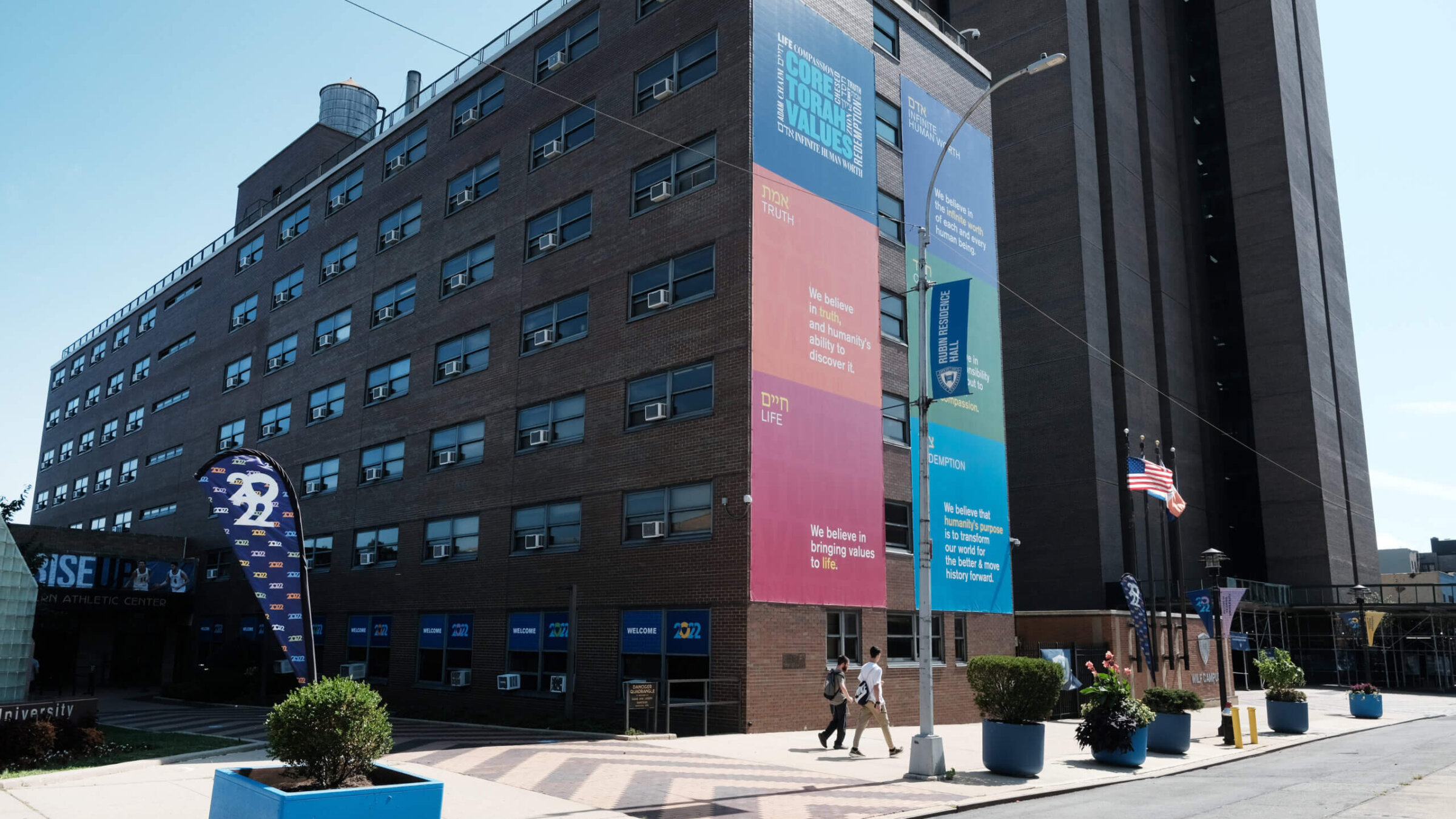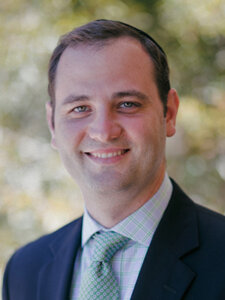Is Yeshiva University entitled to state funds? Religion has little to do with it
YU’s identification as a religious institution would not render it ineligible for the state funds in question, raising serious questions about why this whole kerfuffle got started in the first place.

The campus of Yeshiva University in New York City on August 30, 2022 in New York City Photo by Spencer Platt/Getty Images
The New York Times has once again created a buzz by insinuating that Yeshiva University impermissibly received government funding.
Each recent article title reads as if another New York Times exposé had dropped. “Was Yeshiva University Entitled to $230 Million in Public Funds?” the paper asked back in January. This week’s title was even more tantalizing: “Yeshiva University’s Ban on L.G.B.T.Q. Club Leads to Scrutiny of Funding.”
This ongoing intrigue, spurred on by the Times and a group of state senators, ostensibly flows from Yeshiva University’s stance that it is both a religious institution and entitled to the receipt of certain state funds. According to a letter sent to the university by three New York state senators in January, this constituted a misrepresentation that requires an investigation.
The actual facts of the situation, however, paint a very different picture. The University’s identification as a religious institution would not render it ineligible for the state funds in question, raising serious questions about why this whole kerfuffle got started in the first place.
Yeshiva University remains in ongoing litigation over its refusal to recognize the Y.U. Pride Alliance, an undergraduate student LGBTQ club. Central to one of YU’s core arguments is that it is a religious institution and therefore exempt from local anti-discrimination laws. In the most recent rounds of litigation, New York state courts rejected this argument.
The state senators pressed a different issue, questioning whether YU misrepresented its eligibility for state funds. New York State’s Dormitory Authority has, on multiple occasions, sponsored bonds issued by Yeshiva University to finance construction projects, enabling them to be issued to private investors at a significantly lower interest rate than otherwise available on the market. The letter focuses on two such projects — in 2009 and 2011. Yeshiva University has, like so many other New York universities, taken advantage of this type of funding — indeed, it has done so at least seven times over the past 30 years.
The combined total amount of funds Yeshiva University financed via DASNY in 2009 and 2011 is $230 million — funds that, according to public documents, have already been paid back to the private investors. The state senators, however, “are concerned about the discriminatory treatment of LGBTQ students by Yeshiva University while receiving funds from the DASNY and other state funds.” The university’s “discriminatory behavior and claimed status appear,” according to the letter, “to be at odds with statements the university made to obtain state funds.”
The New York Times, in its latest report, puts the question this way: “If Yeshiva succeeds at being recognized as a religious institution … that would raise a tricky new question: What should be done about the large amount of public money it has received in recent years?”
The senators are sufficiently concerned about these purported inconsistencies that, according to this week’s report, they have asked the New York State inspector general to investigate further.
This argument, however, is a bit bizarre. Yeshiva University has undoubtedly argued repeatedly that it is a religious institution. But religious institutions are not precluded from seeking private financing through DASNY.
In fact, any number of religious universities — the Jewish Theological Seminary, St. John’s University, and, as noted by the Times in its initial report, Fordham University and Siena College — have financed projects with DASNY backing. It seems strange, therefore, to pit Yeshiva University’s claim to being a religious institution as somehow in tension with participating in this sort of government-backed financing.
To be sure, as the senators’ letter makes clear, DASNY-financed projects cannot be used for “sectarian religious instruction,” “a place of religious worship,” or “in connection with any part of a program of a school or department of divinity for any religious denomination.”
But nothing in the state senators’ letter explains why they think Yeshiva University violated these terms. Yeshiva University’s statements in the course of litigation regarding DASNY financing have simply affirmed that it complied with the restrictions on prohibited religious uses.
More importantly, these restrictions on how the institution can use the funds have nothing to do with the status of the institution — that is, whether the institution itself is religious or not. The restrictions would remain in full force whether Yeshiva University is a religious institution, educational institution or any other sort of institution. As a result, it isn’t clear why the senators assert that Yeshiva University’s litigation position — that is, claiming that it is a religious institution — has anything to do with its receipt of DASNY-backed funding.
But it gets even more curious. According to the state senators’ letter, even these restrictions have a caveat. They remain in force only if “the foregoing restriction shall not prohibit the free exercise of any religion.” Thus, they concede that the restrictions on using the DASNY-backed funding would give way if they violate the First Amendment’s protections against government “prohibiting the free exercise [of religion].” Under such circumstances, the institution need not abide by their terms.
And, according to recentSupreme Court rulings, restricting the use of DASNY-back funds does violate these principles. The Supreme Court has stated three times in the last six years that the government may not exclude religion from generally available funding programs.
As the court clarified this past June, this is true whether the government excludes religion based on the status of the institution or on how funds are used. In either case, excluding religion is a form of discrimination that prohibits the free exercise of religion. As a result, even the restrictions prohibiting Yeshiva University from using the DASNY-back funds for religious purposes appear to be void.
One can imagine a creative critic arguing that the Court’s recent statements should not be read backward. Sure, the Court may have said in 2017, 2020 and 2022 that the government can’t impose religious restrictions when making funding available. But those decisions should not control how we interpret agreements between Yeshiva University and DASNY signed back in 2009 and 2011.
The problem with such an argument is that it is likely at odds with current legal doctrine; the default rule is that the Supreme Court’s decisions are fully retroactive. And so, the religious restrictions in Yeshiva University’s agreements with DASNY are presumably void.
So where does this leave us? Nothing in Yeshiva University’s recent litigation, or in the letter sent by the state senators, indicates that Yeshiva University failed to abide by the terms of the financing agreement it entered into with DASNY.
Even if Yeshiva University didn’t abide by the religious restrictions in its agreements with DASNY, those restrictions are likely void under current constitutional doctrine. And, maybe most importantly, Yeshiva University’s claims in its ongoing litigation do not appear to have anything to do with its eligibility for DASNY-backed financing because religious institutions are just as eligible as any other institution.
Given all of this, it certainly makes one wonder why three state senators originally sent the letter and continue to press for an investigation.
The last sentence of their initial letter reads as follows: “We urge Yeshiva University to immediately reverse course and cease its anti-LGBT policies.” Government officials are, no doubt, entitled to weigh in on these important policy issues. They might even, based on such views, champion new legislation to expand the protections afforded the LGBTQ community.
But one certainly hopes that what government officials would not do is initiate an investigation into the purported misappropriation of funds because they separately disagree with an institution’s policy as it relates to the LGBTQ community.
Investigations such as these are supposed to be about maintaining integrity. The exercise of power to intimidate would serve to do the exact opposite.
To contact the author, email [email protected]

















